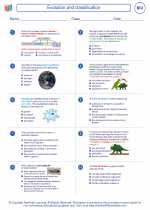Resilience in Biology
Resilience in biology refers to the ability of an organism to withstand and recover from environmental stressors or disturbances. This can include factors such as changes in temperature, pH, salinity, or the presence of pollutants. Resilience is an important trait for the survival and success of organisms in their natural habitats.
Factors Affecting Resilience
Several factors can affect the resilience of an organism:
- Genetic Diversity: Populations with greater genetic diversity are often more resilient to environmental changes, as they have a broader range of traits to draw on for adaptation.
- Physiological Adaptations: Organisms may have specific physiological adaptations that allow them to tolerate or resist environmental stressors, such as heat shock proteins in response to high temperatures.
- Behavioral Responses: Some organisms exhibit behavioral responses to environmental stress, such as seeking out cooler areas in response to heat stress.
- Ecological Interactions: The presence of symbiotic relationships or predator-prey interactions can also influence an organism's resilience, as these interactions can provide additional support or stress.
Study Guide
Here are some key points to focus on when studying resilience in biology:
- Define resilience in the context of biology and provide examples of environmental stressors that organisms may face.
- Explain how genetic diversity contributes to the resilience of a population.
- Discuss specific physiological adaptations that organisms may have to withstand environmental stressors.
- Describe behavioral responses that organisms may exhibit in the face of environmental stress.
- Examine the role of ecological interactions in influencing the resilience of organisms.
Understanding resilience is crucial for comprehending how organisms respond to and survive in changing environments. It also has practical applications in conservation and ecosystem management.
.◂Biology Worksheets and Study Guides High School. Evolution and classification
Worksheet/Answer key Evolution and classification
Evolution and classification  Worksheet/Answer key
Worksheet/Answer key Evolution and classification
Evolution and classification  Worksheet/Answer key
Worksheet/Answer key Evolution and classification
Evolution and classification 

 Worksheet/Answer key
Worksheet/Answer key
 Worksheet/Answer key
Worksheet/Answer key

The resources above cover the following skills:
LIFE SCIENCE (NGSS)
Biological Evolution: Unity and Diversity
Students who demonstrate understanding can:
Construct an explanation based on evidence that the process of evolution primarily results from four factors: (1) the potential for a species to increase in number, (2) the heritable genetic variation of individuals in a species due to mutation and sexual reproduction, (3) competition for limited resources, and (4) the proliferation of those organisms that are better able to survive and reproduce in the environment.
Apply concepts of statistics and probability to support explanations that organisms with an advantageous heritable trait tend to increase in proportion to organisms lacking this trait.
Construct an explanation based on evidence for how natural selection leads to adaptation of populations.